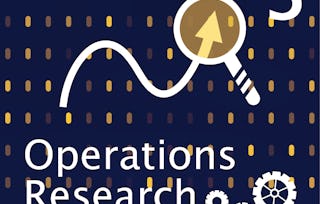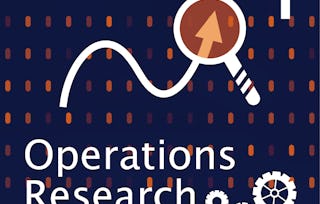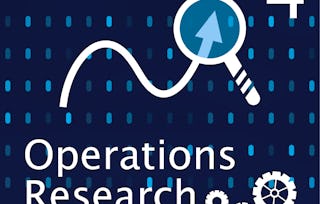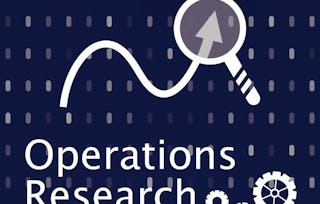Operations Research (OR) is a field in which people use mathematical and engineering methods to study optimization problems in Business and Management, Economics, Computer Science, Civil Engineering, Electrical Engineering, etc.

Operations Research (2): Optimization Algorithms

Operations Research (2): Optimization Algorithms
This course is part of Operations Research Specialization

Instructor: 孔令傑 (Ling-Chieh Kung)
19,642 already enrolled
Included with
158 reviews
Recommended experience
What you'll learn
Learn how to use algorithms to solve different types of optimization programs.
Learn how to use Gurobi solver with Python to solve these problems efficiently.
Skills you'll gain
- Numerical Analysis
- Operational Analysis
- Program Implementation
- Business Analytics
- Process Optimization
- Facility Management
- Applied Mathematics
- Engineering Calculations
- Operations Research
- Calculus
- Decision Making
- Linear Algebra
- Algorithms
- Computational Thinking
- Resource Allocation
- Mathematical Modeling
- Skills section collapsed. Showing 9 of 16 skills.
Details to know

Add to your LinkedIn profile
6 assignments
See how employees at top companies are mastering in-demand skills

Build your subject-matter expertise
- Learn new concepts from industry experts
- Gain a foundational understanding of a subject or tool
- Develop job-relevant skills with hands-on projects
- Earn a shareable career certificate

There are 6 modules in this course
In the first lecture, we briefly introduce the course and give a quick review about some basic knowledge of linear algebra, including Gaussian elimination, Gauss-Jordan elimination, and definition of linear independence.
What's included
7 videos1 reading1 assignment
Complicated linear programs were difficult to solve until Dr. George Dantzig developed the simplex method. In this week, we first introduce the standard form and the basic solutions of a linear program. With the above ideas, we focus on the simplex method and study how it efficiently solves a linear program. Finally, we discuss some properties of unbounded and infeasible problems, which can help us identify whether a problem has optimal solution.
What's included
25 videos1 assignment
Integer programming is a special case of linear programming, with some of the variables must only take integer values. In this week, we introduce the concept of linear relaxation and the Branch-and-Bound algorithm for solving integer programs.
What's included
16 videos1 assignment
In the past two weeks, we discuss the algorithms of solving linear and integer programs, while now we focus on nonlinear programs. In this week, we first review some necessary knowledge such as gradients and Hessians. Second, we introduce gradient descent and Newton’s method to solve nonlinear programs. We also compare these two methods in the end of the lesson.
What's included
13 videos1 assignment
As the last lesson of this course, we introduce a case of NEC Taiwan, which provides IT and network solutions including cloud computing, AI, IoT etc. Since maintaining all its service hubs is too costly, they plan to rearrange the locations of the hubs and reallocate the number of employees in each hub. An algorithm is included to solve the facility location problem faced by NEC Taiwan.
What's included
12 videos1 assignment
In the final week, we review the topics that we have learned and give students a summary. Besides, we briefly preview the advanced course to provide future direction of studying.
What's included
3 videos1 assignment
Earn a career certificate
Add this credential to your LinkedIn profile, resume, or CV. Share it on social media and in your performance review.
Instructor

Offered by
Explore more from Algorithms
 Status: Free Trial
Status: Free TrialNational Taiwan University
 Status: Free Trial
Status: Free TrialNational Taiwan University
 Status: Free Trial
Status: Free TrialNational Taiwan University
 Status: Free Trial
Status: Free TrialNational Taiwan University
Why people choose Coursera for their career

Felipe M.

Jennifer J.

Larry W.

Chaitanya A.
Learner reviews
- 5 stars
89.24%
- 4 stars
8.86%
- 3 stars
0.63%
- 2 stars
0.63%
- 1 star
0.63%
Showing 3 of 158
Reviewed on Sep 15, 2021
The Course was done earlier, hence, there was no one to answer the forums or questions, otherwise a very good course to learn about applying Python.
Reviewed on Feb 11, 2023
Good course. Have concrete examples with enough (but not too much) mathematical details. I like it a lot.
Reviewed on Nov 4, 2023
I want the percentage that I was given when I completed this course

Open new doors with Coursera Plus
Unlimited access to 10,000+ world-class courses, hands-on projects, and job-ready certificate programs - all included in your subscription
Advance your career with an online degree
Earn a degree from world-class universities - 100% online
Join over 3,400 global companies that choose Coursera for Business
Upskill your employees to excel in the digital economy
Frequently asked questions
To access the course materials, assignments and to earn a Certificate, you will need to purchase the Certificate experience when you enroll in a course. You can try a Free Trial instead, or apply for Financial Aid. The course may offer 'Full Course, No Certificate' instead. This option lets you see all course materials, submit required assessments, and get a final grade. This also means that you will not be able to purchase a Certificate experience.
When you enroll in the course, you get access to all of the courses in the Specialization, and you earn a certificate when you complete the work. Your electronic Certificate will be added to your Accomplishments page - from there, you can print your Certificate or add it to your LinkedIn profile.
Yes. In select learning programs, you can apply for financial aid or a scholarship if you can’t afford the enrollment fee. If fin aid or scholarship is available for your learning program selection, you’ll find a link to apply on the description page.
More questions
Financial aid available,

